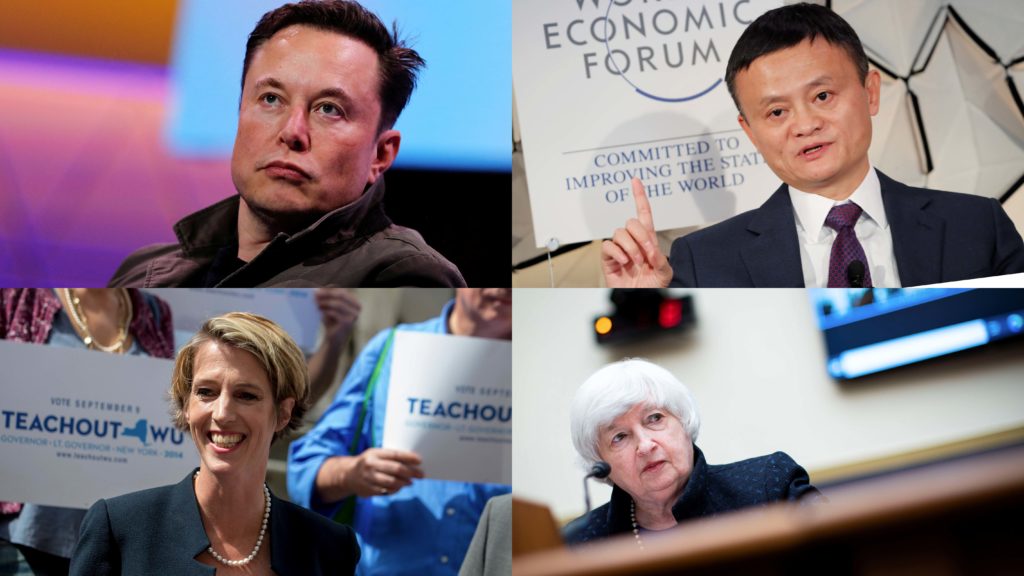See which global business leader most closely shares your views on crypto and Big Tech
Even among Big Tech’s haters and defenders, there isn’t agreement on cryptocurrencies. Answer six questions to find out how your views compare. …


Big Tech and cryptocurrencies are divisive topics among the investors, regulators, and executives who hold sway in tech and finance. Some defend Big Tech companies like Amazon, Alphabet, and Alibaba as solid businesses with great products and steady performance. Others attack the firms for monopolizing industries and bungling content moderation.
Even among Big Tech’s greatest haters and staunchest defenders, there isn’t agreement on cryptocurrencies. Do they offer a utopian alternative to tech firms’ centralized power or are they yet another algorithmic evil designed to enrich venture capitalists at consumers’ expense?
We’d like to know where you stand. Answer six simple questions and we’ll show you where your attitudes fall in relation to prominent voices from around the world, based on public statements they’ve made about Big Tech and cryptocurrencies. Are you more of an Elon Musk or a Janet Yellen?
Anyone with an opinion about these matters will fall into one of the four quadrants on our tech-ideology alignment chart: techno-utopians, tech skeptics, status quo fans, or web3 promoters.
Techno-utopians: the people who like crypto and Big Tech
Techno-utopians believe in technology’s potential to be a force for good, no matter what form it takes. They value the services Big Tech companies provide, and they’re also optimistic that cryptocurrencies will create a more equitable, transparent financial system.
Alibaba CEO Jack Ma, for instance, founded and helms China’s largest e-commerce platform. But he has also floated the idea of using the Alibaba-backed financial services firm Ant Financial to create a blockchain-based tool for sending remittances between countries. “Blockchain technology could change our world more than people imagine,” Ma said in 2018.
Tech skeptics: they’re skeptical of crypto and Big Tech
When companies promise that their technology will change the world, tech skeptics are suspicious. They distrust Big Tech’s power and worry that, at best, cryptocurrencies are a speculative asset in a bubble and, at worst, a thinly veiled scam designed to con investors.
European Central Bank president Christine Lagarde is a skeptic of cryptocurrencies like bitcoin, which she dismissed as “a highly speculative asset, which has conducted some funny business and some interesting and totally reprehensible money laundering activity.” She’s also a big proponent of antitrust reforms to rein in Big Tech. She has accused the firms of weakening the global financial system.
Status quo fans: Big Tech supporters who are skeptical of crypto
Fans of the status quo believe the world of tech is fine just the way it is. They applaud Big Tech companies for delivering consistent returns while offering businesses and consumers quality products at low prices (or for free). They have no interest in wading into the volatile and unproven world of cryptocurrencies.
Warren Buffett is a notable example. He has repeatedly railed against cryptocurrencies. They “have no value and…don’t produce anything,” he says. Buffett likes Big Tech companies, though. He has invested billions in Amazon and Apple. In 2020, he told CNBC that Apple is “probably the best business I know in the world.”
Web3 promoters: crypto supporters who are against Big Tech
Web3 promoters believe the tech needs a shakeup. They see Big Tech companies as relics with too much power. They envision a world in which cryptocurrencies and blockchain-based tools dismantle their authority.
Elon Musk is a complicated case study. He’s an idol of crypto bros. Tesla—the car company he runs—accepts bitcoin as payment and holds bitcoin on its corporate balance sheet. He has breathed life and value into joke cryptocurrencies like dogecoin. But he also worries about crypto’s energy consumption. And despite being the CEO of several large technology companies, he has said that “most big companies in tech have turned into places where talent goes to die” and that “a lot of people are going to be super unhappy with West Coast high tech as the de facto arbiter of free speech.”
Photos Credits: Ndemo: Courtesy Bitange Ndemo, Kaluvu: Courtesy Anne Kaluvu, Teachout, and Wu: Reuters/Brendan McDermid, Yellen: Reuters/Mary Schwalm, Buffett: Reuters/Lucas Jackson, Lagarde: Reuters/Kai Pfaffenbach/File Photo, Gopinath: Reuters/Rodrigo Garrido, Ma: Reuters/Arnd Wiegmann, Dimon: Michel Euler/Pool via Reuters, Musk: Reuters/Aly Song, Son: Reuters/Kim Kyung-Hoon, Wood: Reuters/Brendan McDermid/File Photo